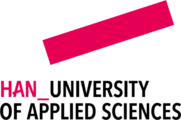Electrical and Electronic Engineering

Looking for a technical career aimed at the future? Become an electrical engineer. Work on the transition to sustainable energy. Or develop smart automated manufacturing or industrial processes. Electrical and Electronic Engineering at HAN gives you a solid start to a rewarding career.
The program for Electrical and Electronic Engineering is based on industry needs. You get all the latest theories. And equally important: you put it into practice. From the very start of the program. So when you graduate you’re an engineer with the right experience.
To become an electrical engineer, you need to know about fundamental theories. But you also need to know how to apply them in practice. That's the strength of this program. It puts you at the heart of real-life electrical engineering projects. Projects where you cooperate with research groups and companies.
Electrical and Electronic Engineering trains you to become an electrical engineer. You get all the fundamental theories. At the same time you put them into practice in projects. Real-life electrical engineering projects that solve actual issues in the professional field.
Throughout your studies, you work with your classmates in project teams. You also get the chance to work with professionals from the field. Your focus in this course is industrial systems and power systems.
- Pažymių išrašas - jei dar nesi baigęs mokyklos, būtina prisegti pažymių išrašą. Smulkesnę informaciją kaip pildyti išrašą ir kada jis reikalingas, rasi čia.
- Brandos atestatas – jei jau esi baigęs mokyklą, išrašo nereikia, užtenka anketoje prisegti savo Brandos atestatą.
Pastaba!
- Motyvacinis laiškas yra NEprivalomas dokumentas stojant į šio universiteto programas.
- Interviu - visi stojantys į bakalauro programas privalo sudalyvauti stojimo procedūroje, kurios metu bus vykdomas interviu. Šio interviu tikslas - išsiaiškinti ar pasirinkta programa atitinka tavo poreikius ir lūkesčius.
Anglų kalbos žinias gali patvirtinti vienu iš šių būdų:
- turėti anglų kalbos pažymį Brandos atestate ir išlaikyti Anglų kalbos valstybinį egzaminą (egzamino rezultatas nėra svarbus, svarbiausia, kad jį išlaikytum)*
arba
- išlaikyti IELTS arba TOEFL testą.
*Jeigu nori pasitikrinti ar tavo anglų kalbos žinios yra pakankamos studijuoti Nyderlandų aukštosiose – suteikiame galimybę laikyti Oxford anglų kalbos testą. Nors anglų kalbos testas nėra reikalaujamas, patartina žinoti savo galimybes ir kalbos lygį.
For Electronic and Electrical Engineering, you need prior knowledge in a few areas. So your secondary education certificate needs to show satisfactory grades in these subjects:
English
Physics
Mathematics
What types of mathematics and physics can you expect in the 1st year?
Mathematics
A brief review of secondary school material (Dutch HAVO):
Solving equations
Logarithmic and exponential functions
Trigonometric functions
Differentiating
New material:
Complex numbers
Vector calculation
Integrating
Introduction to differential equations
Separation of variables
Numeral systems (binary, hexadecimal)
Physics
Electrical networks
Magnetism
Electrical field
Mechanics (translation / rotation)
With a degree in Electrical and Electronic Engineering you can find jobs in the commercial and public sector. For example, in product manufacturing, electro-technical companies, oil and gas processing, food processing or the energy sector. Here are some electrical engineering jobs you could pursue:
Hardware developer. As a hardware developer, you develop innovative electronic products. More specifically, the electronic hardware for these products. You do this using microcontrollers. Customer requirements and specifications are crucial. Your teammates are other engineers and professionals from other disciplines.
Industrial automation developer. As an industrial automation developer, you analyze, design, simulate, program and test automated machinery and processes. The aim? To perform exact or repetitive tasks. Using the same IT solutions used in visualization and monitoring. Possible industries? Product manufacturing, oil and gas processing or food processing.
Power engineer. As a power engineer, you design electrical transmission systems. This involves tasks like calculating and simulating power transmission systems. Also, reviewing power system designs, observing field acceptance tests and inspecting power systems.

